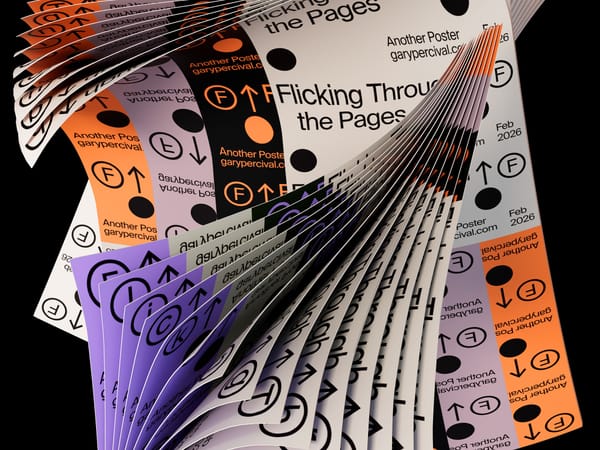Do What You Love, or Keep Looking: Why Settling Isn’t an Option
“Every day spent doing work that doesn’t fulfil you is a day not spent moving toward the work that does.”

We’ve all heard the phrase “Do what you love, and you’ll never work a day in your life.” But for freelancers, graphic designers, and creatives, that advice can sometimes feel more like an unrealistic dream than a practical career path.
The creative industry is filled with uncertainty, financial instability, and the constant challenge of proving your worth. The idea of doing what you love can feel like a luxury rather than a necessity.
But here’s the truth: Settling isn’t an option.
If you’re not doing work that excites and challenges you, you’ll eventually burn out, lose motivation, or worse—spend years feeling like you’ve wasted your potential.
This isn’t about chasing passion blindly or waiting for the perfect opportunity to land in your lap. It’s about refusing to compromise on the kind of work that gives you energy rather than drains you.
The Danger of Settling
Settling doesn’t always look like outright misery.
It often creeps in quietly, disguised as “good enough.” A client pays well, but the work bores you. A job offers stability, but it limits your creative freedom. You tell yourself you’ll do something more exciting eventually.
But eventually it keeps getting pushed further down the road.
Here’s why settling is dangerous:
Creative Stagnation
As a designer, illustrator, writer, or creative professional, your growth depends on pushing boundaries and experimenting. If you’re stuck in a loop of uninspiring work, your skills plateau. You stop learning, and over time, you may even start doubting your abilities.
Resentment and Burnout
Doing work that doesn’t align with your creative ambitions can lead to resentment. You begin to feel like a hired tool rather than a creator. That resentment turns into burnout—where even work you once enjoyed feels like a chore.
Missed Opportunities
Every day spent doing work that doesn’t fulfil you is a day not spent moving toward the work that does. The longer you stay in an uninspiring situation, the harder it becomes to leave.
Money Becomes the Only Motivator
If your only reason for working is financial survival, creativity suffers. You start making safe choices. You take on uninspiring projects. Eventually, you associate creative work with obligation rather than excitement.
The Myth of “One True Passion”
A common reason people settle is because they’re unsure what they really want to do.
They wait for a single passion to reveal itself, expecting a sudden epiphany about their life’s work. But creativity doesn’t work that way.
Most people don’t have one single passion—they have interests that evolve. What excites you today may not be the same thing that excites you five years from now.
The goal isn’t to find a single passion and stick to it forever. It’s to stay curious, explore, and keep moving toward what excites you.
How to Know If You’re Settling
If you’re unsure whether you’ve settled, ask yourself:
- Am I excited about my work, or do I just tolerate it?
- Am I learning and growing, or just going through the motions?
- Would I choose to do this work if money weren’t a factor?
- Do I feel creatively challenged, or just comfortable?
- Am I proud of what I’m creating?
If you find yourself answering “no” to most of these, you might be settling. And that’s okay—acknowledging it is the first step toward making a change.
What If You Can’t Walk Away Yet?
Not everyone can afford to quit uninspiring work overnight. Bills need to be paid, and security matters. But you don’t have to stay stuck.
Here’s how to transition out of a situation where you’re settling:
Start Exploring on the Side
You don’t need permission to start experimenting. Take on a personal project. Try a new creative medium. Explore a niche you’ve been curious about. Doing work that excites you—even outside of paid gigs—can reignite your passion.
Refine Your Ideal Work
If you don’t know what you love yet, start by identifying what you don’t love. Make a list of past projects and separate them into “energising” and “draining.” Look for patterns in what excites you.
Say No to What’s Holding You Back
Not every opportunity is worth taking. If a project doesn’t align with your goals, say no. It’s hard, especially when money is tight, but saying no creates space for better opportunities.
Connect With Others Doing What You Want to Do
If you’re unsure how to move forward, talk to people who are already doing the kind of work you aspire to. Ask them how they got there, what challenges they faced, and what advice they’d give.
Set a Timeline for Change
If you’re in a job or taking on projects you don’t love, set a deadline for when you’ll transition. Whether it’s six months or two years, having a concrete goal keeps you accountable.
The Rewards of Doing Work You Love
Refusing to settle doesn’t mean work will always be easy or fun.
Even the most passionate creatives have moments of frustration. But when you’re working on something that excites you, the hard days feel worth it.
Here’s what happens when you commit to work you love:
- You attract better opportunities. When you do work that excites you, your enthusiasm is evident. Clients and collaborators notice, and more of the right opportunities come your way.
- You push yourself creatively. Work that challenges you keeps you engaged and motivated to improve.
- You build a career you’re proud of. Instead of looking back with regret, you’ll know you spent your time creating work that mattered to you.
- You enjoy the process, not just the outcome. Passionate work isn’t about chasing a final result—it’s about loving the craft itself.
Keep Looking, Keep Moving
The path to doing what you love isn’t a straight line. It’s full of detours, experiments, and pivots. But every step you take toward more meaningful work is worth it.
So, if you’re not doing what you love yet, don’t settle. Keep looking, keep experimenting, and keep moving forward. The work that excites you is out there—but you have to make the space for it to find you.
What’s one small step you can take today to move closer to doing the work you love?



